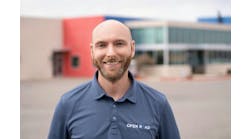The aftermarket is an intergral part of Pellman’s Automotive Service in Boulder, Colo. From memberships to training to using aftermarket parts, the shop uses in the industry in all parts of the shop.
The shop is a member of the Automotive Service Association (ASA), and co-owner Brad Pellman is the education director of ASA Colorado.
“Initially I became involved in ASA a long time ago because of ASA’s reputation and the credential that they provide along with that. They provide a lot of training, which is good, both on the management side and the technical side, which helps us stay on top of current trends and how to deal with issues.”
Being so involved in the aftermarket helps Pellman keep his staff on top of training. All employees complete at least 80 hours of training, in addition to keeping up on ASE certifications. Pellman and his wife, co-owner Lisa, also attend many management courses throughout the year, both industry specific and general business.
“Current technology on cars changes every year. If we’re not prepared and ready for it when it comes in our door, then we’re not going to be a top quality shop,” Pellman says. “We have to stay on top of training. The cars change, especially now, there’s so much going on technology-wise that if we’re not up to date, we’re going out of business.
His learning style carries over into the technicians at the shop, as well. He adds, “I want technicians that want to invest in themselves and that want to move on in the future, and that’s who I hire.”
In fact, Pellman, a Master Technician who is a second set of eyes for his shop, also extends some of the training to other shops. This fall they hosted a hands-on hybrid training class for other shops. When the opportunity arises for hands-on learning, which he finds to be better for technicians, he says why not share it.
“When I get the opportunity to have somebody come into my facility and want to offer training that we can open up to not only my technicians but other technicians in the area, I’m all for that,” he says.
Selling Experience
Technicians at Pellman’s Automotive all have fallen into line quickly with this training program. While some technicians are new to the shop, all have multiple ASE certifications in addition to others, like MACS. That helps Pellman move from making sure the right work is done in the bays to explaining the work to the customers. He uses the training, credentials and ASE Blue Seal Shop designation in his marketing and customer relations.
“A lot of our discussion is talking about these inexpensive brake jobs around the country and explaining why we have to charge more. We’re not being unfair, but all of my technicians, whether they’re doing your oil change or whether they’re doing brakes or rebuilding your engine, have high levels of certification and they’re trained to work on your car,” Pellman explains. “That’s what you’re paying for when you come to my facility. That has a lot to do with our high level of satisfaction in the area.”
The shop’s front office setup also helps with customer service. All three employees can do all aspects of the traditional service advisor’s job, but each specializes in their own area, making workflow smoother. Pellman says he learned that from his background working at a dealership. He feels it helps the technicians keep on task.
“(Technicians) need support staff around them so they don’t have to do things that aren’t directly connected with earning money for the business,” he notes. “When they’re not producing because they’re on the phone talking to a parts store, or they’re up at the front counter talking to somebody or they don’t have a ticket because somebody else has grabbed all of them, in other words the shop manager isn’t managing the flow, then the shop isn’t productive like it should be. These support people in the office, they’re all here to ensure the technicians are able to focus on their main task, which is working on the cars.”
In addition, all of the front office staff is trained in customer service, and certain staff members are trained specifically with how to work with upset customers.
“Our office is the face of our business. A lot of our customers don’t see the shop,” Pellman says. “They don’t understand what’s going on out there, and it’s not safe for them to be out there. We have to have staff in place that presents the business in the right way.
The shop as a whole also works to educate the customers about green automotive repair. Pellman’s Automotive has taken a stance to make sure consumers know how green the automotive industry is, including how the shop recycles, properly disposes of hazardous materials and other ways it goes green.
Spreading the Word
All of these methods to get the word out to customers tie into the shop’s No. 1 form of marketing: word of mouth advertising. Pellman’s Automotive has revised its website, adding more information about the shop and automotive repair education. It also features online reviews, which are the main reason new customers come to the shop.
It ties the website to other online options like Google Adwords, Yelp and RepairPal. The shop has a Facebook page, and monthly e-mail newsletters share information about the shop and vehicle maintenance. Among the offers is the shop’s two-year, 24,000-mile warranty on all work. Not only does the warranty benefit the consumer, but it helps build the shop’s relationship with its suppliers.
“(Offering the warranty) was an easy choice, because we do consistently monitor our parts and our parts sources. And when we don’t like a part from them, and it does happen that they’ll have a certain line of parts that have failed enough to the point that we don’t like them, we stop using them and we find somebody else,” Pellman says. “So we don’t just stick to one company, because I’m associated with them in some way. Because I monitor the quality of parts, it’s easier for me to extend my warranty and just make it better.”
The devotion to the aftermarket and support the shop sees from it helps with the supplier relationship. Pellman says while it’s their job to monitor the parts coming in, the suppliers they use are good about working with them to keep all in the industry in a positive light.
“Our job is to work with companies that are reputable and supply us with good, quality parts, monitor those parts to make sure that they’re meeting an equal standard as to what we feel we’re going to get from the factory or from the dealer and provide those to our customer at a reasonable price point that is profitable for both us and a savings for them,” he says.
Discussions about all of this and more are conducted at the shop’s regular meetings. While shop issues are a priority at these meetings, employee satisfaction is as well. A few years ago, the shop paid for all employees to meet with a financial planner to work on their futures. Overall, Pellman states that the meetings help keep everyone in the shop on the same page.
“It’s important that we all understand that the goal throughout our business no matter what area of the shop you’re working in is to make sure the customer is satisfied with what the end product is. Our staff in the shop isn’t necessarily connected with the customers in the office. They don’t necessarily understand all the time the feelings of the customers related to cost of repair,” he says. “We have to constantly work between all three areas to make sure that everybody understands what’s going on. We provide a lot of documentation for the customer. We want everybody to understand what our total goal in the business is and work for that goal.”
Working for that goal in the end helps the business grow and give back to the aftermarket, which is just one aspect that’s important to Pellman.


